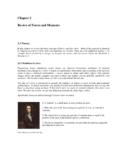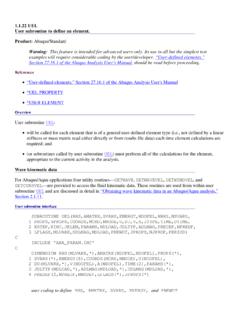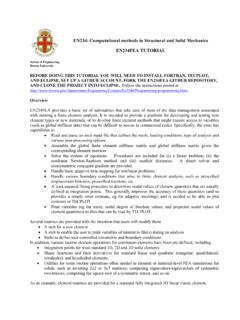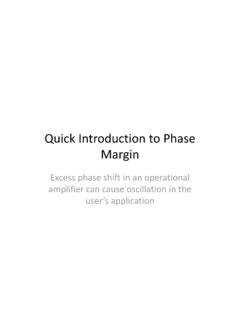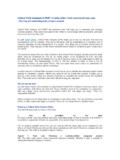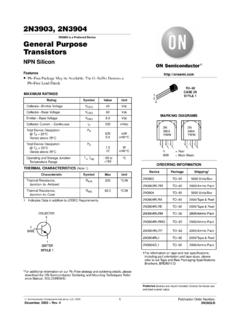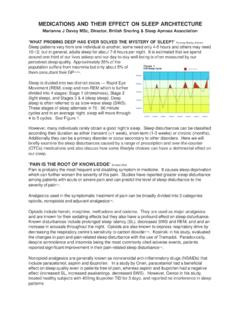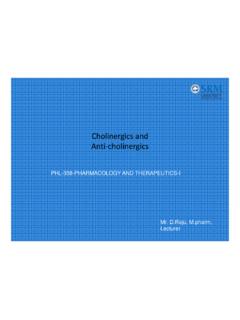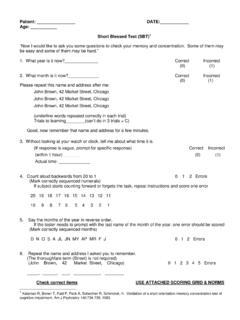Transcription of THE MENTAL STATUS EXAMINATION - Brown …
1 THE MENTAL STATUS EXAMINATION Robert M. House 1. What is the MENTAL STATUS EXAMINATION ? The MENTAL STATUS EXAMINATION (MSE) is a component of all medical exams and may be viewed as the psychological equivalent of the physical exam. It is especially important in neurologic and psychiatric evaluations. The purpose is to evaluate, quantitatively and qualitatively, a range of MENTAL functions and behaviors at a specific point in time. The MSE provides important information for diagnosis and for assessment of the disorder s course and response to treatment.
2 Observations noted throughout the interview become part of the MSE, which begins when the clinician first meets the patient. Information is gathered about the patient s behaviors, thinking, and mood. At an appropriate point in the evaluation the formal MSE is undertaken to compile specific data about the patient s cognitive functioning. Earlier informal observations about MENTAL state are woven together with the results of specific testing. For example, the interviewer will have considerable information about attention span, memory, and organization of thought from the process of the interview.
3 Specific questions during the formal exam clarify more precisely the degree of attention or memory dysfunction. Case. A 55-year-old man presented with recent complaints of sadness and fear of being alone. He also expressed thoughts about death. As he presented his concerns, he rambled to unrelated topics and seemed to lose track of the interviewer s questions. During the formal inquiry he was able to recall only 1 of 3 objects he was asked to memorize and made several mistakes in serial subtractions of 7 from 100. Specific questioning about suicidal wishes and actions revealed that he had overdosed with aspirin 1 month earlier and still experienced suicidal thoughts and wishes to die.
4 The cognitive tests were compatible with mild dementia, and the differential diagnosis included major depression. Further work-up and treatment supported this diagnosis. Cognitive functioning improved with antidepressants. 2. Is the MSE a separate part of the patient evaluation? No. The MSE must be interpreted along with the presenting history, physical exam, and laboratory and radiologic studies. Separate interpretation makes you vulnerable to erroneous conclusions. Collateral information from families and friends is also invaluable to confirm or supply missing data.
5 Case. A 27-year-old man presented to the psychiatric emergency department with somewhat grandiose behavior, pressured speech, irritability, and psychomotor agitation. The initial diagnostic impression was bipolar disorder, manic or drug-induced mania. The patient denied drug abuse. However, questioning his wife uncovered a history of substance abuse, and laboratory evaluation revealed the presence of amphetamine metabolites. The correct diagnosis was amphetamine-induced mood disorder. 3. What key factors should be considered along with the MSE? To assess properly the patient s MENTAL STATUS , it is important to have some understanding of the patient s social, cultural, and educational background.
6 What may be abnormal for someone with more intellectual ability may be normal for someone with less intellectual ability. Patients for whom English is a second language may have difficulty understanding various components of the MSE, such as the proverbs. Age may be a factor. In general, patients over the age of 60 years tend to do less well on the cognitive elements of the MSE. Often this is related to less education rather than to aging alone. 4. What are the major components of the MSE? Components vary somewhat from author to author. However, most detailed MSEs include information about appearance, motor activity, speech, affect, thought content, thought process, perception, intellect, and insight.
7 2 Major Components of the MENTAL STATUS EXAMINATION Appearance Age, sex, race, body build, posture, eye contact, dress, grooming, manner, attentiveness to examiner, distinguishing features, prominent physical abnormalities, emotional facial expression, alertness Motor Retardation, agitation, abnormal movements, gait, catatonia Speech Rate, rhythm, volume, amount, articulation, spontaneity Affect Stability, range, appropriateness, intensity, affect, mood Thought content Suicidal ideation, death wishes, homicidal ideation, depressive cognitions, obsessions, ruminations, phobias, ideas of reference, paranoid ideation, magical ideation, delusions, overvalued ideas Thought process Associations, coherence, logic, stream, clang associations, perseveration, neologism, blocking, attention Perception Hallucinations, illusions, depersonalization, derealization, d j vu, jamais vu Intellect Global impression: average, above average, below average Insight Awareness of illness Adapted from Zimmerman M: Interviewing Guide for Evaluating DSM-IV Psychiatric Disorders and the MENTAL STATUS EXAMINATION .
8 Philadelphia, Psychiatric Press Products, 1994, pp 121 122. 5. What is the first step in the MSE? A determination of consciousness must be the first step in MSE. Basic brain function determines the patient s ability to relate to the surroundings and cooperate with the interviewer. Disturbance of this basic function affects higher level MENTAL processes that make up the major portions of the exam. The Glasgow Coma Scale was developed by Teasdale and Jennett in 1974 to assess impaired consciousness. It is based on eye opening and motor and verbal responses to stimuli.
9 The scale ranges from 3 (deep coma) to 14 (full-alert wakefulness). Glasgow Coma Scale CATEGORY SCORE Eyes open (E) Spontaneously 4 To speech 3 To pain 2 None 1
10 Best motor response (M) Obeys command 5 Localizes pain 4 Flexion to pain 3 Extension to pain 2 None
